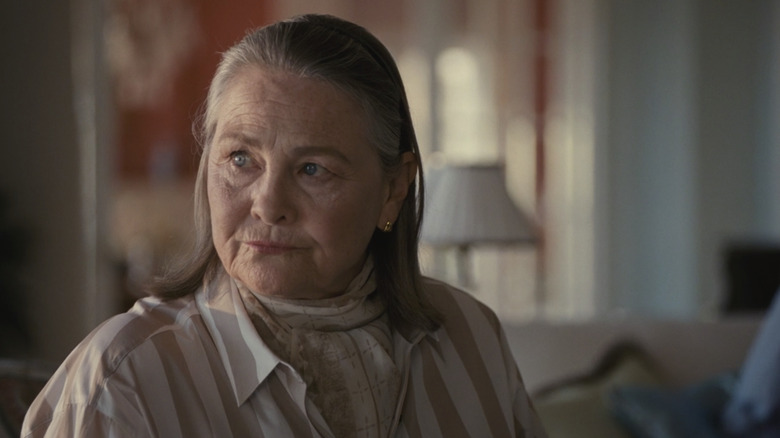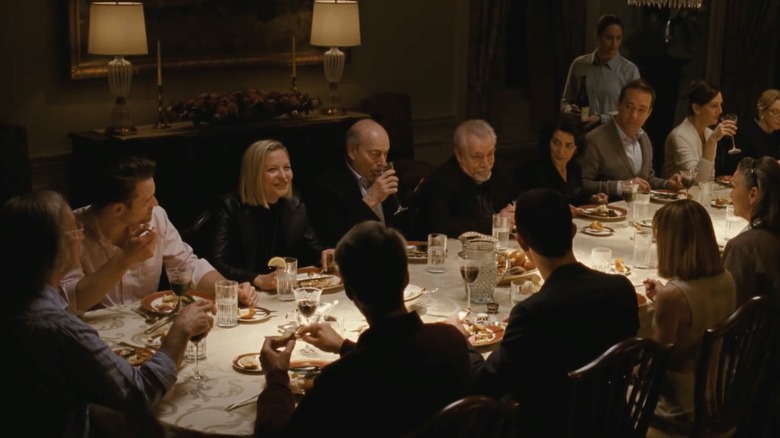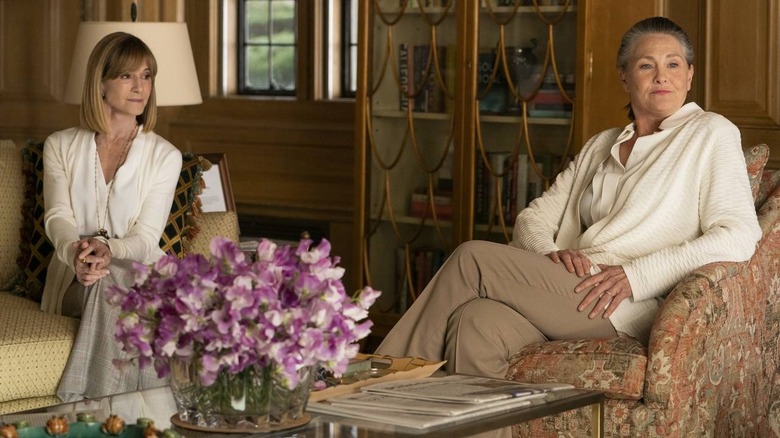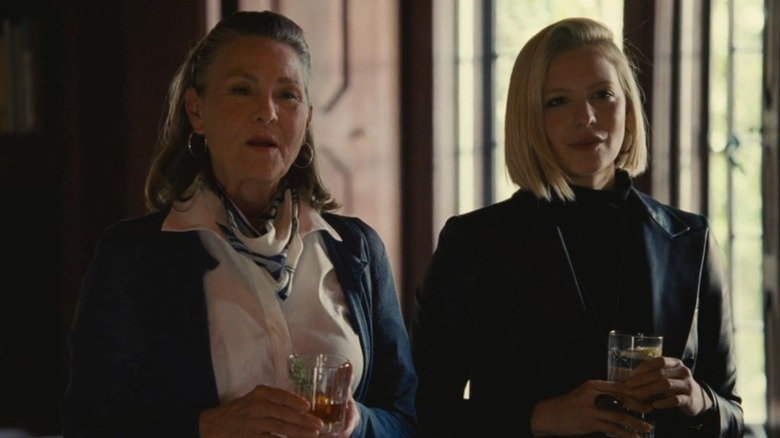In Succession Season 4, The Pierces Are A Different Kind Of Evil
This article contains spoilers for "Succession."
Nobody in "Succession" is a hero, but villains come in many forms. The family of right-wing media titans at the center of the hit HBO series, the Roys, wield their wealth like they are carelessly brandishing a weapon. Their left-leaning rivals, the Pierces, prefer concealed carry. They mask their greed with a paper-thin veil of morality, grimacing at their flashy counterparts for being grossly money-hungry while dining on hundred-dollar bills.
"Succession" raises an interesting question about the American elite on either side of the aisle: is it better to feign working class consciousness from a multi-million dollar mansion, or does being upfront about decidedly capitalist interests make them any less despicable?
Logan Roy, played by the Emmy Award-winning Brian Cox, has never shied away from admitting his interests are purely economic. "What are people?" Logan asks in the season 4 premiere. "They're economic units. I'm 100 feet tall. These people are p*gmies. But, together, they form a market."
As he is forced to confront his own mortality, Logan becomes more and more detached from the outside world. For the Murdoch-inspired mogul, society is past saving — not that he ever cared to help it in the first place. "He's a misanthrope," Cox explained in a behind-the-scenes segment for HBO. "He really doesn't like where human beings are going and he feels that they're not worth respecting."
This anti-social approach has long earned him the ire of his biggest competitors, the Pierce family, headed by their matriarch Nan (Cherry Jones). Ironically, both Nan and Logan seem to neglect the part that they have each played in shaping the world. While Logan and (occasionally) his children lean into the inhumane nature of business, the Pierces deny it altogether.
Noblesse oblige vs. No obligations
The Pierces take an intellectual and embarrassed approach to wealth. They downplay the grandiosity of their homes by calling it their "funny little house" and even turn up their noses at their own display of abundance, suggesting that the gardeners "shred hundred dollar notes for fertilizer."
Even their drinks symbolize their false ties to the working class, like the break-bumper cocktail recipe allegedly snatched from the wallet of Teddy Roosevelt's valet — a man of the people's people. In the season 4 premiere, Nan offers the Roy siblings wine as a way of deferring their negotiation and reiterating her disinterest in money. "They might as well be jars of jam to me, but the connoisseurs seem to like them," she says. "I'm afraid I have peasant taste." In her attempts to appear down-to-earth, she displays an embarrassment of riches.
Rather than yell at their staff like Logan or use them as footstools like Tom, Nan insists that the housekeeper have a drink with their guests. When she turns Nan down and explains that she has to finish preparing dinner, Nan can't understand why someone in the midst of doing a difficult job wouldn't want to indulge in a drink. "You never treat yourself," she chides.
"I winced when I saw that," Jones confessed to Vulture, "But I just thought, 'You do it with just absolute innocence because that's what she is.' It's wrong of me to say that[,] that Nan is an innocent [...] one can say willful obliviousness when it comes to what is required to serve the Pierces. Noblesse oblige. That seems to be the way these folks move through the world, feeling that they are a gift to the world because of their beneficence."
Embarrassed of their riches
When it comes to negotiation, the Pierces are resistant to discussing money. Instead, they prefer to veil the discussion with talk of values. Ironically, "I triumph in the truth" is written on the wall of their family estate in Latin, and yet they conceal the truth of their interests at every turn. At nearly every mention of money in the season 4 premiere, Nan responds by calling it "disgusting" or "horrible."
Anticipating that Nan prefers to focus on virtue and integrity, as she once said herself, Kendall and Shiv attempt to appeal to her moral scruples first. They explain that they will keep the journalistic values of PGM intact, whereas Logan will not. Rather than be swayed by this argument, it is Nan herself who gears the conversation back toward money.
"That's all good and well," she responds, "but obviously with one thing and another we have a responsibility to get the best possible deal for my family and the other shareholders."
Although Shiv's political background and Kendall's rebellion suggest that they have more left-leaning values than their father, Nan made it very clear that this would not guide her choice for the sale. As much as she insists that this negotiation is "not about the numbers," the number is exactly what it comes down to.
It's easy to pretend that money is not important when there is so much of it to go around. The Roys might place too much value in the market, but the Pierces prefer to pretend that wealth and class don't exist at all.
"Money is a social construct, whereas virtue, integrity, these things actually exist," Nan insists in season 2. Tom, who grew up in a middle-class family, jokes that he paid for his groceries "by telling them I was really worried about the environment."
It's not about the numbers — until it totally is
Pretending to ignore the numbers isn't just a way for Nan to keep up her charade, it also proves to be a shrewd business tactic. The Pierce matriarch asks about the Roy siblings' financing, then catches herself by adding that she doesn't "understand it all" and that it's "very confusing." She makes it seem like a silly mistake when she says "eight" and "nine," as if she's just let Logan's offer slip, but she is knowingly misleading them into over-bidding.
There's a reason why not a single member of the seemingly boundless Pierce family — save possibly for the fashionable and rebellious Naomi — is considered a fan favorite. Rather than relishing the unattainable excess that all Americans dream of, they snidely comment on how awful it is, as if others should feel sorry for how rich they are.
In the Pierce liberal value system, the only divide that exists in America is a political one, which makes the Republican Roys their natural enemies. But why, then, would they allow themselves to be bought up by any member of a family that they find so deplorable? Perhaps because their liberalism is just its own form of veiled classism. They may claim to value the working man, but they sever themselves from his concerns by burying themselves in the decidedly wealthy man's world of Ivy League academia — accumulating PhDs and acting like money doesn't exist.
The differences between the Pierces and Roys are manyfold, but they can be summed up succinctly. When Naomi is asked to recite a passage from Shakespeare at dinner, she quotes, "mine honor is my life."
"Would you like to hear my favorite passage from Shakespeare?" Logan later rebuttals. "Take the f***in' money."



